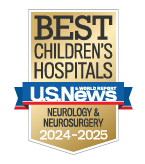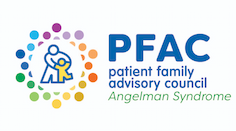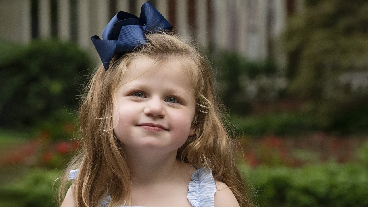Angelman Syndrome Clinic

About our clinic
The Angelman Syndrome Clinic at Children’s Mercy is one-of-a-kind in the region and designed to be a medical home for children with Angelman syndrome and their families.
What is a medical home? It’s where all of your child’s needs are addressed and your family’s Angelman syndrome journey is supported. The clinic includes a lead physician and nurse coordinator who will get to know your family, assess your child’s needs, and connect you with the right subspecialties and research opportunities.
What is Angelman syndrome?
Named after the physician who discovered the disorder, Angelman syndrome is a rare genetic disorder caused when one gene on the 15th chromosome, called UBE3A, doesn’t work. (For more in-depth information about the genetics of Angelman syndrome, please see this report from the Angelman Syndrome Foundation.) We still don’t understand everything about the UBE3A gene, but we do know that it is important to brain development, speech, movement, and learning. About one in every 15,000 children are born with Angelman syndrome. That means there are around seven new diagnoses in Missouri and Kansas each year — and a half a million people living with Angelman syndrome around the globe.
Caretakers and physicians usually start to notice symptoms of Angelman syndrome between birth and 12 months of age. They include:
- Low muscle tone
- Positive, excitable temperament
- Developmental delays
- Seizures
- Sleep issues
- Speech issues
- Gastrointestinal issues
- Behavioral problems
Genetic testing can tell if your child’s UBE3A gene is affected. Angelman syndrome is sometimes misdiagnosed as autism or cerebral palsy because some of the symptoms overlap. Getting a correct diagnosis is the first step toward getting the best possible treatment for your child.
Right now, there is no cure for Angelman syndrome, but researchers are working on some promising therapies. Children with Angelman syndrome have normal life expectancies. They will need care and support but can live rich, full lives. Every day, we are learning more about how to help children with Angelman syndrome reach their full potential.
What does our clinic provide?
- The Angelman Syndrome Clinic at Children’s Mercy offers a medical home for children with Angelman syndrome.
- Your family will meet with our lead physician and nurse coordinator regularly.
- We will coordinate your child's care so that you can see all the specialists you might need in one place. In most cases, these appointments will be on the same day as the clinic, or the day after, especially for families traveling to Kansas City.
- Participating subspecialties include Genetics, Nutrition, Gastroenterology, Orthopedics, Speech and Language Pathology, Developmental and Behavioral Health, and Physical and Occupational Therapy.
- All clinic patients will be offered the option of participating in Angelman syndrome research studies.
- Our clinic will be guided by a Patient Family Advisory Council. If you are interested in participating, please apply here.
What to expect when you visit our clinic
Before every visit, our nurse coordinator will call to get an update on your child’s progress and current needs. That pre-assessment will include questions about current treatments, medications and concerns. We’ll use that conversation to set the agenda for your clinic visit and to schedule appointments with other specialists for your child. Our Patient and Family Services team will help arrange the appointments and, if necessary, coordinate transportation and lodging.
The clinic is held at the Neurology Clinic on the Adele Hall Campus. Your visit with our lead physician and nurse coordinator will take approximately 1 to 1.5 hours. Appointment length with other specialists will vary.
If you have questions or concerns outside our scheduled monthly clinic and/or pre-visit calls, you can contact the clinic team at AngelmanSyndrome@cmh.edu or (816) 302-8073.
Angelman Syndrome Patient Handbook
Angelman syndrome resources
Gifts from these two nonprofits have helped fund our clinic and our research efforts:
These sites also offer valuable information about Angelman syndrome and current research:
- FAST
- NIH: Genetic and Rare Diseases Information Center
- NIH: National Institute of Neurological Disorders and Stroke
Advice from parents and caregivers
The Angelman Syndrome Clinic at Children’s Mercy is a start to a journey you may not have dreamt of, but they will help your child achieve their dreams. Welcome to the greatest group of parents, families and misfits who will never give up finding care and treatment for their children!

Angelman Syndrome Patient Family Advisory Council
The Angelman Syndrome PFAC supports the highest standard of excellence at Children's Mercy through meaningful collaboration between families and hospital staff.
Learn moreAngelman Syndrome: Maddie's Story
When Maddie was diagnosed with Angelman syndrome, it changed the course of her family’s life forever, setting them on the path to help launch the Angelman Syndrome Clinic at Children’s Mercy.

Madison Lauren Sargent Endowed Professorship in Neurology/Angelman Syndrome; Interim Division Director, Neurology; Director, Neuroscience Research; Professor of Pediatrics, University of Missouri-Kansas City School of Medicine; Clinical Assistant Professor of Pediatrics, University of Kansas School of Medicine
